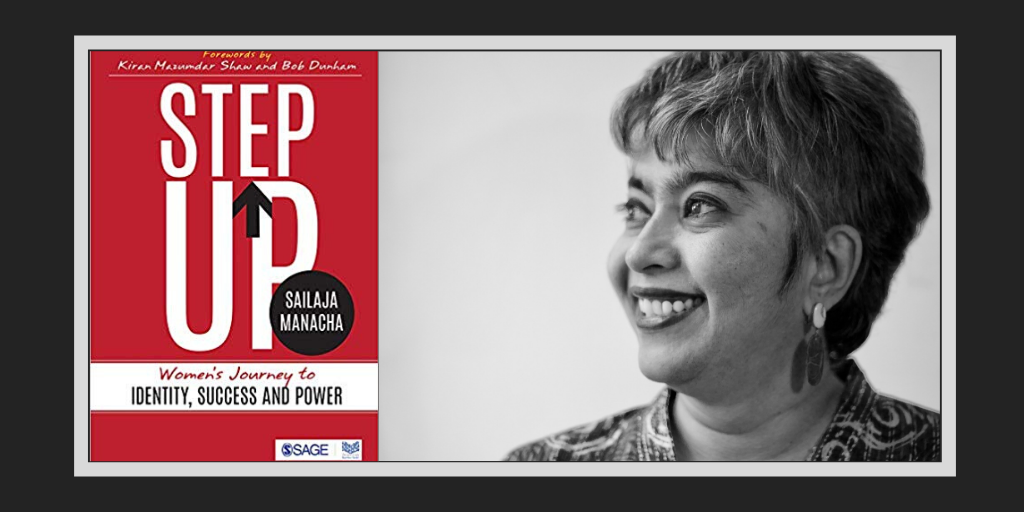One could say that today, women occupy more leadership positions in businesses and workplaces than they have ever done before, which of course is true. Women are now establishing their own startups, managing entire companies, and occupying leadership positions such as CEO and CFO in big multinational companies. But one goes up the ladder, the numbers start seeming somewhat lacklustre, women’s representation in top management is still not that impressive. Which is obviously a consequence of a lot of factors acting together; for example, unequal access to education, gender-based discrimination, absence of inclusive hiring policies etc. Another factor, though it’s not much talked about, is the psychological barriers that now exist in women’s mind that stops them from taking leadership roles head-on. This is what psychotherapist and leadership coach Sailaja Manacha’s book, Step Up: Women’s Journey to Identity, Success and Power talks about.
Step Up: Women’s Journey to Identity, Success and Power
Author: Sailaja Manacha
Publisher: SAGE Publications India Pvt Ltd; First edition (5 November 2019)
Genre: Business, Self-Help
Positives
Manacha is a trained psychologist, psychotherapist, and leadership coach. She uses a mix of psychology, practice-based self-reflective tasks, and management and leadership techniques that women can employ in their lives; be it at their workplaces or in their homes. According to her, Step Up’s goal is to act as a guide to women in leadership at all levels. A guide which gives them the power to ‘become designers of their life and work’. While Step Up certainly isn’t the typical garden variety self-help guide as it does address some key issues that stop women from taking on leadership roles, it does miss the mark at certain points of time and seems a bit out of touch. Let’s understand why.
According to her, Step Up’s goal is to act as a guide to women in leadership at all levels. A guide which gives them the power to ‘become designers of their life and work’.
Step Up is obviously a successful effort. With two shining forewards by Kiran Mazumdar-Shaw and Bob Dunham, the book outlines how women can overcome psychological (mostly), emotional and social obstacles that can keep them from climbing up the ladder and occupying leadership roles. Divided into 14 chapters, the book includes many scenarios of Sailaja’s interactions with her actual clients and draws on their experiences to point out where women might get stuck and need help. For example, one of her clients, who has had trouble speaking up in front of people due to a childhood public speaking incident gone wrong, finally addresses the issue of her inner child’s fear of speaking up in public.
Sailaja then outlines some practices that, in the long term, also might act like solutions to various problems. Every chapter follows a similar pattern. The author introduces a problem, provides either personal or her clientele’s anecdotes, and provides practice-based solutions at the end of each chapter. The latter is truly a great way to address self-esteem and confidence issues that women face in their workplaces. For example, in one chapter, Manacha focuses a lot on changing perceptions like ‘I don’t know enough’ and ‘I don’t have enough experience to do this’ into ‘I can, and I will’. In one chapter, she also touches on the subject of male allies in workplaces, which is an interesting take on how men can also help promote the idea of more women in leadership. The chapter to chapter transition is quite seamless and does give the reader an illusion of going on a transformative journey.
Also read: Book Review: Not Just Another Story By Jhimli Mukherjee Pandey
Shortcomings
What Step Up does fail to do is maintain consistency in the ideas that it seems to be promoting. At certain points of time, the reader might just get confused about the author’s intentions. For example, early into the book, Manacha provides an example of a woman leader who was rubbing off wrong to her peers and suggests that the leader tries to become less aggressive in her ways. There’s nothing essentially wrong with the idea, but one needs to ask themselves if something similar might ever be said about a man. Gendered perceptions of assertiveness, leadership, and what constitutes a “good leader” itself is a huge problem in many workplaces.
Gendered perceptions of assertiveness, leadership, and what constitutes a “good leader” itself is a huge problem in many workplaces.
And while Manacha’s focus is on the group of women who want to occupy leadership roles and address the issues that they face at their workplaces. Manacha, as a psychotherapist, could have also addressed rampant sexism that exists at workplaces and worked with organisations to make them a better place for working women. It is often not what goes into making a good leader but what comes after it that shapes the identity of a leader. Are male-dominated spaces as inclusive as they seem to be under ‘diversity’ based hiring policies? Look here you have an assertive woman as a boss, do her peers respect her and accept her authority as they would of a man’s? These are some of the questions that I would have liked the book to answer.
Also read: Book Review: Unruly Visions: The Aesthetic Practices Of Queer Diaspora By Gayatri Gopinath
Give It A Read!
Still, Step Up is a commendable effort and parts of it can prove to be genuinely useful for working women. It serves as a good guide for women to understand their own potentials. Thinking they’re not qualified enough, afraid of speaking up if they don’t know much about a subject, and self-censoring are some of the many ways women stop themselves from taking on roles that are not just meant for them but can also flourish under their leadership. Step Up addresses these issues quite well.
You can buy Step Up at your nearest bookstore or online.
Featured Image Source: Physis
About the author(s)
Purnima is a wannabe writer and a want-to-be cat mom.




